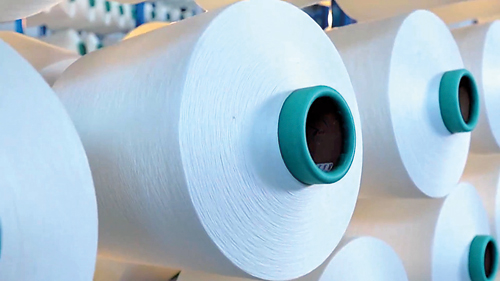Sri Lanka’s T-20 World Cup jerseys made from recycled plastic waste
View(s):
The final spool of yarn at the yarn partner, Eco Spindles Sri Lanka’s, plant
MAS Holdings has manufactured
Sri Lanka’s ICC T-20 World Cup jerseys using fugitive plastics collected from around the island.
MAS Active, together with their supply chain partners TRISCHEL Fabric (Pvt) Ltd and Eco Spindles Sri Lanka, leveraged their combined capabilities to transform discarded PET waste into recycled polyester, which is then manufactured into high quality wearable material, MAS said in a media release.
The Sri Lanka Cricket 2021 T-20 World Cup jersey achieves international sportswear standards, maintaining fit, comfort, breathability and high absorbance. The design of the 2021 jersey is inspired by the scales and texture of the Black Ruby Barb, a tropical fish endemic to Sri Lanka as well as elements of peacock feathers extracted from the iconic low country dance masks which are traditionally symbolic of protection and safety.
“We hope the jerseys worn by the
Sri Lankan cricket team are a reminder to the public to reuse plastic products and responsibly recycle their waste.” said Sarinda Unamboowe, CEO of MAS Kreeda.
This is not the first time the Sri Lankan cricket team’s choice of jerseys is made of 100 percent recycled material. In 2019, over 30,000 PET bottles collected from Sri Lankan beaches were made into recycled polyester, which was used to create the 2019 World Cup jersey for the Sri Lankan cricket team. In 2020, MAS stepped up these efforts, collectively recycling 21 million fugitive PET bottles. “We are proud of our continued innovation and manufacturing capabilities that contribute to disrupting Sri Lanka’s pollution cycle,” said Nimesh Amalean, General Manager – Business at MAS Active.
“Using the World Cup as a springboard, in 2019 MAS furthered its efforts in addressing the issue of fugitive plastic waste, by setting up 10 large plastic bins in the shape of a cricket ball, as collection points for plastic waste dumped along the coastal line of Sri Lanka,” it said.


